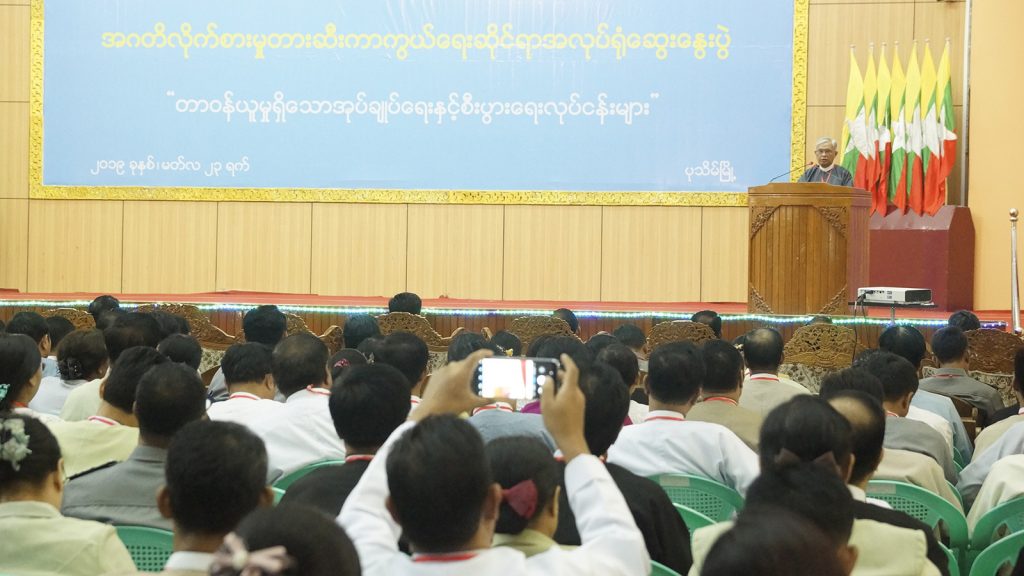24 March
UNDP organized a workshop entitled “Accountable governance and Economic Enterprises” which was held in collaboration with Anti-Corruption Commission (ACC) and Ayeyawady Region Government, at the City Hall, Pathein Town, Ayeyawady Region, yesterday morning.
At the workshop, Ayeyawady Region Chief Minister U Hla Moe Aung and Anti-Corruption Commission Chairman U Aung Kyi delivered opening speeches, and Regional ministers, members of commission and external experts, together with a total of six local businessmen, then took part in the workshop in the form of a roundtable discussion.
In his remarks delivered at the workshop, Ayeyawady Region Chief Minister U Hla Moe Aung said that he extended his congratulation on making the endeavours of disseminating knowledge to the people. As for the Regional government, cooperation would be made to the emergence of a corruption free zone, and the purpose of holding the workshop was to raise awareness about anti-corruption while aiming to reduce corruption. Corruption was a terrible system which could lead the country towards a state of poverty, and efforts would be made to combat it. Moreover economic growth would be developed as long as we could decrease the level of corruption. Next, the Anti-Corruption Commission Chairman U Aung Kyi said that many workshops were being launched as part of reducing lawsuits, promoting integrity, conducting educational works and speeding up preventative measures to do so. As for the authority concerned, they would have to initiate themselves, together with their organizations and to make sacrifices aiming to change the whole system, and which became the process of the democratization indeed. He still believed that there were many people who were persistently against corruption, and they should take a leading role in fighting against the corruption. It was time for them to combat the terrible system of corruption in unison together with the people.
As for the government officials who have spirits of honesty and integrity, and who have made their commitment to reducing corruption, they were urged to investigate corruption and to take legal action against it in line with the civil service law if there were minor forms of corruption. If they found major forms of corruption in the departments, they were urged to transfer the cases to Union Ministries or the Commission, as early as possible, through the relevant governments. If they found the possible threat of corruptions in the rulings, procedures, rules, regulations and directives of the departments, they were urged to submit the cases to the Union Ministry, CPU and other relevant organizations beforehand. The formation of CPU was relevant with the Sustainable Development Goals (SDG) 16 and as being the case, anti-corruption can be regarded as Universality. By changing ourselves, endeavours should be made to change our organizations and to uplift prestige of our community while promoting the works of governance and economic conditions of the State.
Then Chairman of the Anti-Corruption Commission and Regional Chief Minister posed for documentary photographs together. Next, member of the Anti-Corruption Commission U Soe Tint discussed a topic titled, “Measurements of Anti-Corruption Commission”, regional minister for Planning and Finance U Htay Win discussed a topic titled, “Accountable Governance Sector”, Dr. Tin Maung Than (Thank Bawa) discussed a topic titled, “Accountability of Governing Sector”, Dr. Zaw Oo discussed a topic titled, “The Role of CSO Accountability”, U Win Myint Aung from the Merchants and Industry Association discussed a topic titled, “Accountability for Economic Sector”, and local business personnel U Win Myint Hlaing discussed a topic titled, “Accountable Business Enterprises”.
Following that, officials concerned replied to queries raised by the attendees, and Regional Chief Minister made a review on the discussion of results. There were a total of 500 attendees and the workshop was attended by members of the commission, departmental officials from the Ayeyawady Region, officials from UNDP, CSOs, business personnel and media. — IPRD, (Translated by Win Ko Ko Aung)


